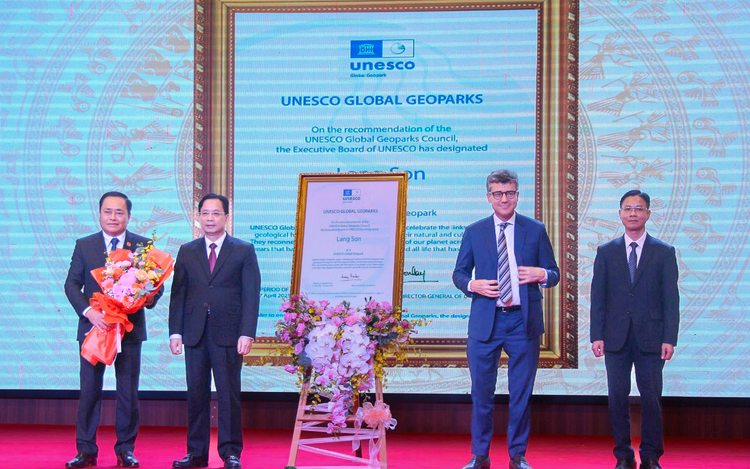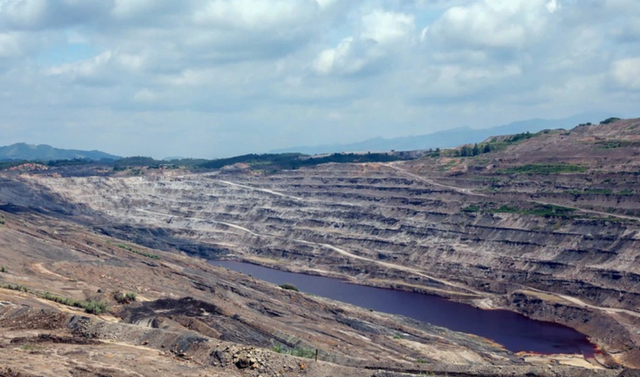
Jonathan Wallace Baker (R, 2nd), UNESCO representative in Vietnam, presents the UNESCO Global Geopark certificate for Lang Son Geopark to the leadership of Lang Son Province. Photo: Thanh Cong / Tuoi Tre
The certificate, presented at a ceremony hosted by the Lang Son administration on Saturday, welcomed the park into a network of 229 geoparks spanning 50 countries, making it the fourth in Vietnam to receive this honor.
The council's recognition in September 2024 followed by UNESCO's formal announcement in April 2025 set the stage for the ceremony.
Previously in November 2023, Lang Son authorities worked closely with the Vietnam National Commission for UNESCO under the Ministry of Foreign Affairs to finalize the nomination dossier.
At the ceremony, Jonathan Wallace Baker, UNESCO representative in Vietnam, presented the certificate to the provincial leadership.
He described a UNESCO Global Geopark as a living model of harmony between people and nature, promoting sustainable development and improving community livelihoods.
Baker highlighted Lang Son Geopark's record of tens of millions of years of evolutionary history and its importance in informing responses to climate change and natural disasters.

This image depicts the Na Duong Basin, a geological site dating back some 40 million years within Lang Son UNESCO Global Geopark in Lang Son Province, northern Vietnam. Photo: Nam Thanh / Tuoi Tre
Deputy Minister of Foreign Affairs Ngo Le Van called the designation a testament to efforts in preserving and promoting Vietnam's cultural and natural heritage, including intangible traditions like Mother Goddess worship and 'then' singing – a performance combining literature, music, and dance of the Tay, Nung, and Thai ethnic groups.
He encouraged integrating sustainable development principles into geopark management to protect geological, cultural, and ecological assets while supporting community livelihoods.
Chairman of the Lang Son administration Ho Tien Thieu pledged to implement comprehensive conservation measures and promote heritage values in line with UNESCO criteria, helping to showcase Vietnam's image globally
Under the 2025–30 development plan, Lang Son intends to finalize conservation planning, upgrade infrastructure connecting heritage sites, enhance research and digitize geological and cultural data, and develop tourism products that reflect local identity.
The province will review and finalize its conservation framework, strengthen transport connections and site accessibility, build a unified database of geocultural information, and craft tourism offerings rooted in local heritage and ecology.
Established in December 2021, the Lang Son Global Geopark spans over 4,840 square kilometers and is home to nearly 627,500 people—representing roughly 58 percent of the province's area and 78 percent of its population.
The geopark encompasses 38 attractions along four tourism routes, featuring both scientifically significant and adventurous sites such as Nguom Mooc Cave and Tham Lum and Ung Roac sinkholes.
Before Lang Son, the three other UNESCO Global Geoparks in Vietnam include Dak Nong Global Geopark in the Central Highlands province of Dak Nong, and Dong Van Karst Plateau Global Geopark in Ha Giang Province and Non Nuoc Cao Bang Global Geopark in Cao Bang Province, both in northern Vietnam.


Max: 1500 characters
There are no comments yet. Be the first to comment.